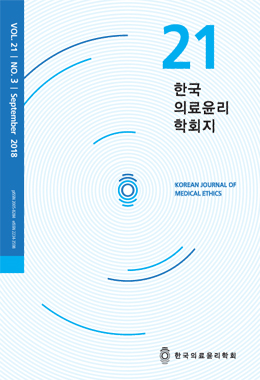4차 산업혁명시대가 도래했다는 관심이 증가되면서 이에 따른 윤리적 이슈에 대한 탐구 및 대학 교육의 방향에 대한 제고가 필요하게 되었다. 본 논문의 목적은 4차 산업혁명 시대의 대표적 기술분야인 인공지능, 빅데이터, 유전체 기술, 가상현실의 윤리적 이슈 및 국내외 정책과 교육 현황을 살펴보고 앞으로 대학의 생명윤리교육이 나아가야 할 방향을 제안하는 것이다. 4차 산업혁명시대의 국내외 정책과 교육현황을 요약하면, 국외는 4차 산업혁명 기술의 잠재적 이득과 사회적 위험에 대한 법적, 윤리적 고려를 바탕으로 관련 가이드 라인 및 규제 권고안이 발표되었고, 과학 기술의 발전에 따른 학생들의 윤리적 가치 확립의 중요성이 정책적으로 강조됨에 따라 4차 산업혁명시대의 기술개발과 관련된 생명윤리교육과정이 개설된 바 있으며, 대학 내 윤리실험실 개설, 공개 토론회를 넘어 온라인 공개 강좌를 통해 생명윤리 교육의 접근성을 높이고 있다. 국내의 경우에도 최근 공청회 등을 통해 4차 산업시대의 정책방향에 대한 논의가 이루어지고 있으며, 대학교육 또한 시대적 흐름에 맞는 생명윤리 교육을 제공하기 위한 시도가 이루어지고 있다. 그러나 국내 대학의 생명윤리교육은 전통적인 생명윤리 주제에 새로운 과학기술로 야기된 윤리적 이슈를 일부 추가하여 운영되는 교육과정이 대부분이며, 단일 전공 교수자의 강의 운영, 선택 과목, 비정기적인 강의 개설, 그리고 온라인 공개 강좌의 부재 등의 제한점이 확인되었다. 이에 따라, 본 논문에서는 추후 국내 대학의 생명윤리교육을 개선하기 위한 방안을 다음과 같이 제안하고자 한다; 국내 대학의 생명윤리교육은 다직군 간 교육으로 개발되고, 점진적으로 필수 교육과정으로 지정하여 교육의 기회를 확보하며, 온라인 공개 강좌로 확대 개설할 필요가 있다. 또한, 대학내 생명윤리 이슈에 관한 공개 토론의 장을 마련하고 과학기술의 발전과 그 변화를 함께할 수 있도록 주기적인 논의를 통해 생명윤리교육의 내용을 지속적으로 개선해야 할 것이다.
This article explores some of the ethical issues associated with the fourth industrial revolution and suggests new directions for bioethics education in Korean universities. Some countries have recently developed guidelines and regulations based on the legal and ethical considerations of the benefits and social risks of new technologies associated with the fourth industrial revolution. Foreign universities have also created courses (both classroom and online) that deal with these issues and help to ensure that these new technologies are developed in an ethically appropriate fashion. In South Korea too there have been attempts to enhance bioethics education to meet the changing demands of society. However, bioethics education in Korea remains focused on traditional bioethical topics and largely neglects the ethical issues related to emerging technologies. Furthermore, Korean universities offer no online courses in bioethics and the classroom courses that do exist are generally treated as electives. In order to improve bioethics education in Korean universities, we suggest that (a) new course should be developed for interprofessional education; (b) courses in bioethics should be treated as required subjects gradually; (c) online courses should be prepared, and (d) universities should continually revise course contents in response to the development of new technologies.




